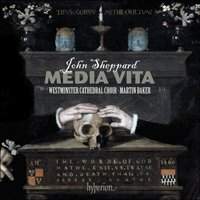Texte paru dans: / Appeared in: |
|
|
Outil de traduction ~ (Très approximatif) |
|
|
Reviewer: J.
F. Weber Martin Baker has followed his exquisite set of William Byrd’s Masses (Fanfare 38:3) with an earlier Tudor composer, John Sheppard (c. 1515–1558), offering a generous program of three masterly works. Media vita, the title given to the disc from the opening work (“In the midst of life we are at the point of death”), summons up one of the classic tales of music history. Gustave Reese (quoting Peter Wagner’s 1924 article) tells it most memorably in Music in the Middle Ages (Norton, 1940): “When, in the year 1263 the Archbishop of Treves [Trier] appointed a certain William to be Abbot of the monastery of St. Matthias against the will of the monks, they prostrated themselves on the ground and said the Media vita and other prayers, and thus hoped to get protection from the Abbot who was being forced upon them….William fled in fear. The Council of Cologne in 1316 forbade the Media vita to be sung against anyone without the bishop’s permission.”
The memorable chant is both an antiphon and a responsory. As an antiphon, it belongs to the canticle Nunc dimittis at the Office of Compline in the Dominican rite for the third and fourth Sundays of Lent; as a responsory for the Septuagesima season leading up to Lent, it includes three verses (the third a doxology) followed by the partial respond. Sadly, the chant is often recorded incomplete, losing the cumulative power of the repeated supplication after each verse, “Merciful Savior, do not deliver us to a bitter death.” Of several fine versions, the most widely available come from the monks of Silos and the Ensemble Octoechos.
Sheppard’s setting includes all of this: the responsory, the canticle, and three verses (not the same texts as the chant version) with the imploring partial respond after each, and it lasts precisely half an hour, the most expansive performance on records. While Peter Phillips, David Allinson, Paul McCreesh, Harry Christophers, and Owen Rees have recorded the work with credit, my favorite until now has been the one by Stile antico (30:5; 31:1), a marvelous performance by a dozen adult mixed voices. I would not part with the utmost restraint of their approach, but Baker spins out this masterpiece ineffably. The two must be compared for their complementary values.
The second selection is the glorious Marian responsory Gaude, gaude, gaude Maria in a version only marginally broader than the others. David Wulstan, Harry Christophers (twice), Edward Darlington, David Allinson, and Andrew Nethsingha have done justice to the piece, but Stile antico on the same disc as the first responsory also won acclaim in a performance of the same high quality as the first piece. The contrast between two superb performances by a vocal ensemble and a cathedral choir of men and boys is striking, and both are well worth hearing.
Missa Cantate has needed a recording as good as this. David Wulstan, Harry Christophers, Simon Ravens, Paul McCreesh, and Duncan Ferguson have all had a try at it, some better than others, with McCreesh’s (24:4) an outstanding example of liturgical reconstruction. But the men and boys on this disc (arguably the finest cathedral choir in the world) have been trained to replicate the sound that Sheppard would have heard during Mary Tudor’s restoration (and the recusant Byrd later would have longed to hear). When the sound of this choir filled the newly erected Byzantine-style cathedral in the 1890s, its founder, Richard Terry, began to pioneer the revival of Tudor church music, at the time hardly remembered. No doubt his latest successors (David Hill, James O’Donnell, and now Baker) have achieved an excellence that Terry could only aim for.
For the Mass, the comparison
between this cathedral choir and Harry Christophers’s vocal ensemble (33:4
for the reissue) is similar to the competition in the other two works.
Christophers made a complete set of Sheppard’s Masses, an additional reason
to credit his alternative to the choral version. But Baker, though his
tempos are barely slower than Christophers’s, achieves a degree of solemnity
that fits the music admirably. There is no Kyrie, for in Sheppard’s time the
Sarum use of a troped Kyrie to fit the liturgical occasion was normal, as
McCreesh demonstrated. I would not part with these three versions of the
Mass. That said, Baker’s program of three masterpieces makes up a disc that
any Tudor aficionado will not want to miss. Highly recommended. | |
|
Support us financially by purchasing this disc from eiher one of these suppliers. Un achat via l'un ou l'autre des fournisseurs proposés contribue à défrayer les coûts d'exploitation de ce site. |
|
|
|
|
|
Cliquez l'un ou l'autre
bouton pour découvrir bien d'autres critiques de CD |
|




